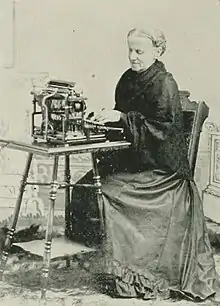Cynthia Roberts Gorton
Cynthia M. Gorton (née Roberts; pen name, Ida Glenwood; February 27, 1826 - August 10, 1894) was a blind 19th-century American poet and author. For 20 years, Gorton lectured on behalf of the temperance movement.
Cynthia Gorton | |
|---|---|
 | |
| Born | Cynthia M. Roberts February 27, 1826 Great Barrington, Massachusetts, U.S. |
| Died | August 10, 1894 (aged 68) Fenton, Michigan, U.S. |
| Resting place | Oakwood Cemetery, Fenton |
| Pen name | Ida Glenwood |
| Occupation | Poet, author |
| Language | English |
| Nationality | American |
| Alma mater | Emma Willard School |
| Spouse | Fred Gorton |
Early life and education
Cynthia M. Roberts was born on February 27, 1826 in Great Barrington, Massachusetts.[1] She was the youngest of five children. Her father, Samuel Roberts, died when she was one, leaving the family in poverty.[2]She sometimes lived with friends or family to ease the burden on her widowed mother.[3]
Gorton began writing poetry as a child, and was reportedly reserved and isolated from other children.[2]
Gorton attended the Emma Willard School in Troy, New York.[3] When Gorton was 14 and still a student, her mother died. She was offered the opportunity to continue her studies as a "teacher-scholar," but her eyes, already poor condition, made it too difficult.[3][4]
Career
In 1847, at the age of 21, Gorton married Fred Gorton, a wealthy paper manufacturer, and the couple moved to Fenton, Michigan. Six years later, after a long illness, she became completely blind.[1] She became temporarily dependent on others to transcribe her thoughts to paper.[2]
Gorton's first prose work, The Fatal Secret, was written wholly with a pencil, but she wrote so rapidly in an unconscious manner that she formed almost an entire new alphabet, unreadable except by those who had followed the transformation. Gorton began using a typewriter for her writing shortly thereafter.[2]
Gorton was widely known by her pen name "Ida Glenwood." Sometimes, she was also called "The Sweet Singer" and "The Blind Bard of Michigan."[1] She went on to publish an additional romance novel, Lily Pearl and The Mistress of Rosedale.[5]
Gorton's first published poem appeared in The Philadelphia Inquirer. She wrote many serials, stories and poems for the Detroit Christian Herald and other papers and periodicals.[1] These included The Fatal Secret, or a Romance of Mackinac Island, Kate Wynans and the Forger's Daughter, Ma Belle Queen, Tangled Threads, Black France, and others.[2]
Gorton was also involved in the temperance movement, presiding at public meetings, lecturing and reciting original poems. Her short career as a platform speaker began with the recitation of a poem entitled Adolphus and Olivia, or a tale of Kansas.[2] She became renowned for her oratorical skill, and the ability to recite poems for over an hour and a half. Governor Reuben Fenton once noted "one must conclude, after listening to 'The Blind Bard of Michigan,' that if we would find the best and deepest poetical thoughts, we must look for them in the emanations from the imprisoned soul." For 20 years, Gorton lectured frequently to audiences in Michigan, before becoming more reclusive in her later years. She used her typewriting skills to share letters with other "shut-ins".[1]
Death
Gorton passed away on August 10, 1894, at the age of 68, at her home in Fenton.[5] She was buried in Oakwood Cemetery in Fenton.[4][3]
Selected works
- Fatal Secret, 1873
- The Wife's Appeal: a poem, 1873
- Lily Pearl and the Mistress of Rosedale, 1892
References
- Willard & Livermore 1893, p. 328.
- Moulton 1893, p. 281.
- "Famed Poet and Author Called Fenton Home in The 1800s". Fenton, MI Patch. 10 August 2011. Retrieved 5 October 2017.
- "Much of Fenton's rich history rests in Oakwood Cemetery". Tri-County Times. 20 May 2016. Retrieved 5 October 2017.
- Hogan, Vera (August 10, 2011). "Famed Poet and Author Called Fenton Home in the 1800s". Patch. Retrieved September 20, 2023.
Attribution
 This article incorporates text from this source, which is in the public domain: Moulton, Charles Wells (1893). The Magazine of Poetry. Vol. 5 (Public domain ed.). Charles Wells Moulton.
This article incorporates text from this source, which is in the public domain: Moulton, Charles Wells (1893). The Magazine of Poetry. Vol. 5 (Public domain ed.). Charles Wells Moulton. This article incorporates text from this source, which is in the public domain: Willard, Frances Elizabeth; Livermore, Mary Ashton Rice (1893). A Woman of the Century: Fourteen Hundred-seventy Biographical Sketches Accompanied by Portraits of Leading American Women in All Walks of Life (Public domain ed.). Moulton. p. 328.
This article incorporates text from this source, which is in the public domain: Willard, Frances Elizabeth; Livermore, Mary Ashton Rice (1893). A Woman of the Century: Fourteen Hundred-seventy Biographical Sketches Accompanied by Portraits of Leading American Women in All Walks of Life (Public domain ed.). Moulton. p. 328.
Bibliography
- Greasley, Philip A. (8 August 2016). Dictionary of Midwestern Literature, Volume 2: Dimensions of the Midwestern Literary Imagination. Indiana University Press. ISBN 978-0-253-02116-8.
External links
 Works related to Woman of the Century/Cynthia M. R. Gorton at Wikisource
Works related to Woman of the Century/Cynthia M. R. Gorton at Wikisource- Works by or about Cynthia Roberts Gorton at Internet Archive
- Select poems by Cynthia M. Roberts Gorton at The Magazine of Poetry